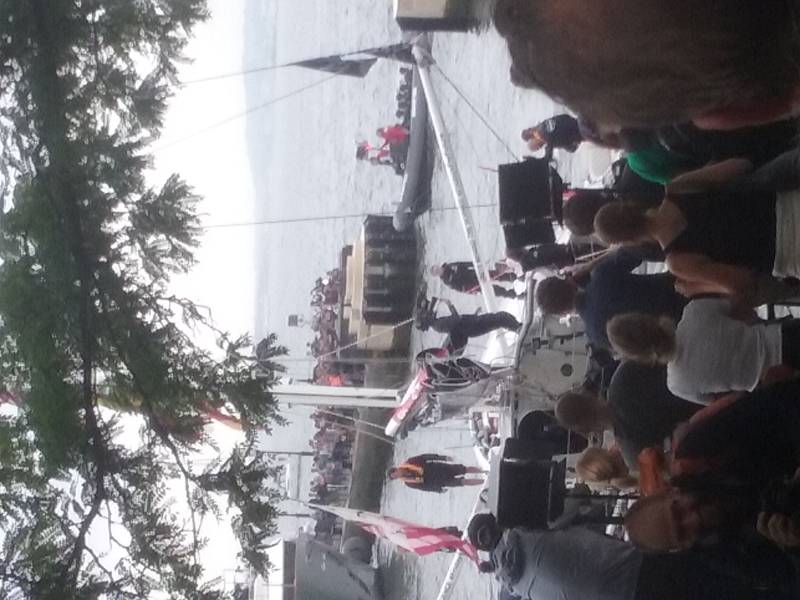Greta Thunberg spoke at an event organized by The Intercept, interviewed by Naomi Klein.
Having seen her TED talk and various videos of her and as a professor of leadership and host of the Leadership and the Environment podcast, I was curious how she carried herself in person. What could others learn from her—around leadership, the environment, and environmental leadership?
I first saw her speak at the North Cove marina in lower Manhattan when the boat that sailed her here, the Malizia II, arrived. Here she is:

Despite talented and impassioned speakers before and after her, she commanded the room.
For those who don’t know, Greta, as she is widely known, started striking for climate action in 2018 by spending Fridays outside the Swedish Parliament instead of school with a sign saying “skolstrejk för klimatet” (school strike for climate).
She describes herself on Twitter as a “16 year old climate activist with Asperger’s.” She has created a lifestyle polluting minimally, eating no animal products and not flying. Time Magazine named her one of the worlds most influential teens. She was nominated for the Nobel Peace Prize.
In my fourth year myself since choosing not to fly, not having filled a load of household trash in over a year, I’m overjoyed at her bringing sustainable living closer to mainstream, though we have a long way to go.
How she commanded the room and engaged the audience:
She picked an important topic, arguably the issue of our time. Rather, she felt compelled by it and couldn’t stop. She sticks with it and doesn’t lose focus. She often characterizes it as the house being on fire. Would you lose focus if your house was on fire?
Nearly everyone else on the stage that evening promoted some alternate agenda, usually a project of theirs. Greta did not. She spoke only about her topic—the environment. That focus showed dedication, passion, and maturity.
She served that purpose beyond her personal goals—or she made the team’s goals hers. We want to follow leaders who, when trouble arises, we know what they’ll do, in particular that they’ll serve the team before themselves. Greta didn’t just say she cared. Talk is cheap. He communicated it in her speech and behavior—not considering crossing the Atlantic until the sailboat option appeared, for example.
By contrast, nearly everyone she shared the stage with flew there. One wonders if New York City lacked climate activists to invite without the greenhouse emissions, but that’s another topic.
Greta focused on her interviewer, Naomi Klein, when Klein spoke. She didn’t digress. We like people who listen without interrupting. To her credit, Klein took a supporting role, showcasing Greta.
Greta answered with simple language, to the point. It’s hard to think of environmental leaders or workers of any sort who speak simply.
Greta avoided politics. She stayed humble to science, which she let lead her. She didn’t try to reinterpret the world to fit what she wants—what most people to do justify flying and other global warming activity. She fit what she wants to the needs of our existence on Earth.
By contrast, nearly no one else on the stage followed science. They spoke instead of political plans, personal web projects, and attempts to rally the audience. Greta, by not trying, succeeded more.
Her body language was simple and undistracting. Others called attention to themselves, which distracted from their message. Greta, by not calling attention to herself, communicated more clearly, which engaged the audience more effectively.
Her goal seemed to be to help others in the service of her cause, to clarify issues, to solve problems.
She didn’t engage on points she seemed to consider irrelevant. When people talked politics or social media, she followed them to a point, but didn’t engage nearly on the scale she engaged on science and what to about it.
She shared of herself candidly, for example speaking about using a bucket on the boat for two weeks since, as a racing boat, it had no toilet, or her Asperger’s.
Some adjectives to describe her:
Simple, humble, unaffected, clear, thoughtful, measured.
If you care about leadership, the environment, or environmental leadership, I recommend watching videos of Greta. Even if you don’t, the environment demands leadership and nearly no one is leading as genuinely, authentically, and effectively as her.
See for yourself. Here is the event. Naomi Klein begins introducing her at 36:38 and Greta begins speaking at 42:45.

